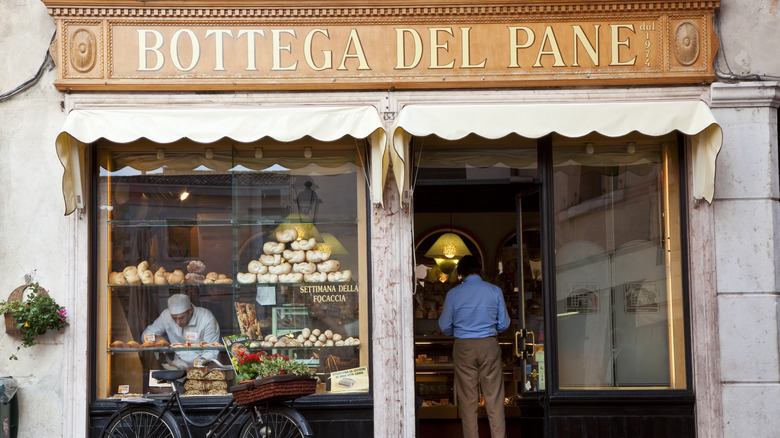Here's Why Bread Feels Lighter, Fluffier, And Overall Better In Europe Vs The US
Many visitors to Europe wonder why, after indulging freely in pizza and baguettes, they don't feel bloated or uncomfortable compared to eating the same food back home. While this difference mostly comes down to ingredients and preparation, there is also a cultural element at play.
Bread is a staple of daily life throughout Europe, just as it is in the U.S. It is present in every meal and is one of the most inexpensive and delicious snacks to refuel with during your explorations. From an appetizing smørrebrød open sandwich in Denmark, to the comforting papo secos in Portugal, or an oven-fresh baguette in one of the most mouth-watering bakeries in Paris, bread is absolutely everywhere. In Germany alone there are more than 300 varieties of bread, and that is not even counting the more than 1,200 types of "brötchen" and "kleingebäck" (small rolls and pastries).
While it may sound surprising, many gluten-intolerant people report fewer symptoms of gastrointestinal discomfort after treating themselves to bread products in Europe vs. the U.S. Let's explore some reasons why that may be. However, note that these comments refer to a sensitivity to gluten, manifested through inflammation, bloating, or constipation, and not to people living with celiac disease, who must follow doctor-recommended dietary restrictions wherever they may travel, just as if you are traveling with food allergies.
Ingredients and bread-making in Europe vs. the U.S.
Wheat varieties used in Europe have a lower gluten content than those used in the U.S. While artisanal bakeries in the States are reviving old-world techniques, mainstream American bread still relies heavily on additives – some of which are banned in Europe – used as whiteners, rising agents, or to extend the bread's shelf life. Another reason travelers find European bread doesn't upset their stomachs is the prevalence of slow fermentation, as in the method used for sourdough, which breaks down gluten, making it easier to digest.
American bread often contains another added ingredient that is not found in European bread: sugar. The BBC reported that in Ireland, the rolls used by the deli-sandwich chain Subway were found to contain too much sugar to qualify as bread. The court decision was made in the context of a tax dispute, as bread is considered a staple product exempt from value-added tax, but the rolls did not pass muster.
Europe takes a considered approach to bread production, providing a framework for ingredients and protecting artisanal know-how. Take France, for example. The popular "baguette tradition" can only contain wheat flour, water, salt, and yeast – zero additives — and must be baked on the premises. This explains why the baguette is only good for a day or so, hence the daily ritual of ordering the perfect baguette at the boulangerie.
Other factors can make bread seem better in Europe
This brings us to the subtle element of culture. Europeans tend to prioritize freshness and flavor, they do their food shopping more often, and buy just what they need for a day or two. It naturally follows that their providers, including bakeries, will strive to meet these quality expectations. In addition, meals are generally enjoyed at a slower pace than in the U.S. A Belgian commenter on Reddit said that this derives from a "Bourgondic" attitude to life. The term refers to the Dukes of Burgundy, who in the 1400s ruled over a powerful empire that stretched from France to what is today the Netherlands — the Burgundian court was known for its lavish hospitality.
When it comes to enjoying treats during our travels, the vacation effect can also make you feel that food is better in Europe than in the U.S., and that of course includes the delicious bread. When we travel, we tend to be relaxed, and often more active, which can contribute to better digestion. Adding this bonus element to the already winning combination of ingredients, rules, and tradition, it is not surprising that when it comes to bread, Europe rises to the occasion.


